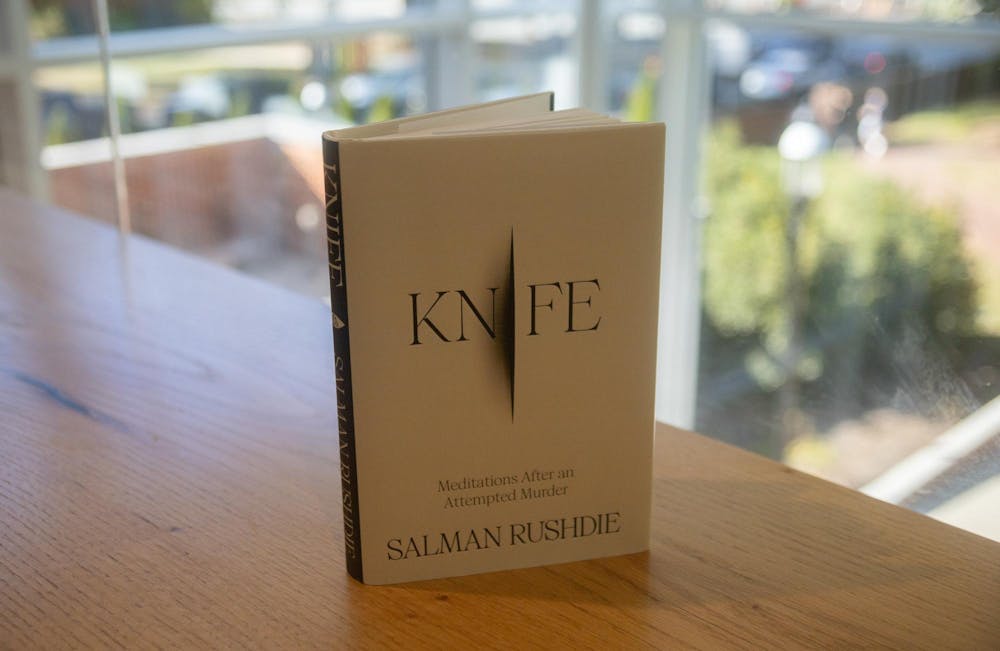In honor of the annual awareness campaign Banned Books Week, promoted by the American Library Association, English professors Dan Burns and Dinidu Karunanayake decided to co-lead a reading and discussion of Salman Rushdie’s memoir “Knife: Meditations After an Attempted Murder.” While not technically a banned book, “Knife” describes the aftermath of the assassination attempt on the controversial author in 2022. Burns hosted the second meeting covering the memoir on Oct. 21 in Carlton 224.
“I bought into this book thinking we were finally going to get an incredible writer who can talk about what it’s like to almost die,” Burns said. “I thought, ‘We’re going to get something visceral and powerful from Rushdie along those lines.’”
A limited number of copies of the book are still available for free in Alamance 305. Currently, the discussion is being led by faculty within the department of English, but the meetings are open to students and faculty of all disciplines.

Elon English professors Dan Burns and Maggie Kelly discuss the themes within Salman Rushdie's memoir on Oct. 21 in Carlton 224.
Rushdie’s fourth novel, “The Satanic Verses,” published in 1988, brought him into infamy after many Muslims found its narrative and use of Islam blasphemous. In 1989, the controversy reached diplomatic levels when former Supreme Leader of Iran, Ayatollah Ruhollah Khomeini, issued a fatwa — a religious ordinance — against Rushdie. Khomeini offered a bounty for the assassination of the author and anyone involved in the making of the book. As a result, Rushdie had to go into hiding for almost 12 years.
More than 30 years after the fatwa was issued, Rushdie was scheduled to speak at an event in 2022 promoting the safety of authors when his attacker emerged from the crowd. After being stabbed 12 times, the author was rushed to the hospital where he underwent multiple surgeries, according to his memoir. This event and his recovery process are all depicted in “Knife,” Rushdie’s 22nd novel. Additionally, Rushdie reflects on the attack by exploring the idea of a knife as a metaphor throughout the book:
“Language, too, was a knife. It could cut open the world and reveal its meaning, its inner workings, its secrets, its truths. It could cut through from one reality to another,” Rushdie wrote in his book. “If I had unexpectedly been caught in an unwanted knife fight, maybe this was the knife I could use to fight back. It could be the tool I would use to remake and reclaim my world.”
Burns credited the idea for the reading to Elon professor of religious studies Brian Pennington. Originally, Pennington proposed to have a faculty reading of Rushdie’s work following the attack in 2022, but the idea fell through until it was revitalized after the publishing of “Knife” in April 2024. Burns said he had hoped for the memoir to give insight into the consequences that can come from banning a book. Elon professor Rosemary Haskell, an attendee of the discussion, echoed Burns.
“It’s an interesting study of celebrity, of what it means to be famous and what it means to be famous for writing. And then for being endangered, and now he’s famous again for having been almost murdered,” Haskell said. “It is a meditation on fame, celebrity, infamy and notoriety.”
Burns said he intended for these meetings to be on a very modest scale so the discussion was open and supported a variety of topics. The attending professors considered the different literary techniques within the novel, the parts they enjoyed, the book’s connections to current events and their critiques of the work. The discussion also examined the nature of banned books and what led “The Satanic Verses” to be banned in the first place.
“He talks about it, not only in this dismissive way, but also as though the book has escaped him somehow as a writer. It certainly went far beyond what he might have intended,” Burns said. “And nobody really cares about intentionality, but the fact that it came back to haunt him in such a vicious way, it makes us, I think, almost reflexively consider it.”
The third and final meeting will be held from 12:30 to 1:30 p.m. Nov. 18 in Carlton 224. After the final meeting, Burns is hoping to host another discussion in the spring covering Judy Blume’s classic coming-of-age novel, “Are You There God? It’s Me Margaret,” which is banned in multiple libraries across the country.


